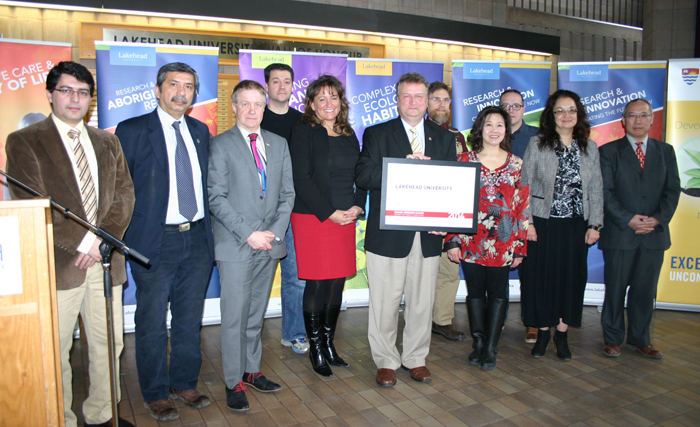Board of Governors Upholds Province’s Tuition Framework
April 7, 2015 – Thunder Bay, ON
In accordance with Ontario’s tuition framework, Lakehead University’s Board of Governors Executive Committee approved a 3% increase to its 2015–2016 academic year’s tuition fees. The Executive Committee heard a deputation from Lakehead University Student Union representatives before discussing the matter and voting.
“Our Executive Committee has decided to increase tuition by three percent for Lakehead’s 2015–2016 academic year, as outlined in Ontario’s tuition framework,” said Board of Governors Chair, Murray Walberg.
Walberg explained that raising the cost of our students’ tuition is a not a decision the Executive Committee makes quickly, or takes lightly. “After various discussions and consultations, the Executive Committee has deemed this necessary in order to keep up with inflation and deferred maintenance costs that increase exponentially above government funding,” he said.
Several Lakehead strategies, including the University’s international recruitment efforts, have averted the need to cut academic programs, or lay off faculty and staff, during the current, difficult economic challenges facing the province’s post-secondary institutions.
“In the end, we make these decisions in order to maintain the quality education our students deserve,” Walberg added.
The 2015-2016 academic year will be the third year of the province’s four year tuition framework. For more information, see the Ministry of Training, Colleges and Universities’ 2013 media release:
QUICK FACTS
- Lakehead’s 3% increase equals approximately $1.4 million in additional revenue for 2015–2016. Ten percent of that additional revenue, or $140,000, will be turned into more student bursaries.
- The 2015–2016 increase means a Lakehead University Faculty of Arts and Sciences student paying about $6,000 for tuition in 2014–2015 will pay approximately $175 more, next year.
- On average, Ontario Student Assistance Program (OSAP) recipients pay 50% of the 'sticker' price of tuition (COU, June 2014). This means a full time, first year, domestic Bachelor of Arts student attending Lakehead in 2015–2016 would pay approximately $3,000 in tuition.
- From 2005–2013, financial aid to Ontario university students increased 127%, while non-repayable aid increased 182% (Council of Ontario Universities).
- When adjusted for inflation, average Canadian student debt has not increased since 2000 (Association of Universities and Colleges of Canada, July 2014).
– 30 –
Media: For more information or to arrange interviews, please contact Brandon Walker, Media Relations Officer, at (807) 343-8177, or mediarelations@lakeheadu.ca.
In 2015, Lakehead University will celebrate 50 years of exceptional education. Guided by its Strategic Plan (2013-2018), Lakehead is known for providing an education focused on independent thinking, unconventional scholarship, and a close sense of community. About 9,700 full-time equivalent students and 2,000 faculty and staff learn and work in ten faculties at two campuses in Orillia and Thunder Bay, Ontario. Lakehead University is a fully comprehensive university: home to Ontario’s newest Faculty of Law in 44 years, the Northern Ontario School of Medicine, and faculties of Engineering, Business Administration, Health & Behavioural Sciences, Social Sciences & Humanities, Science & Environmental Studies, Natural Resources Management, Education, and Graduate Studies.
Maclean’s 2015 University Rankings places Lakehead University 2nd in Ontario and among Canada’s Top 10 undergraduate universities, and 1st among Ontario’s undergraduate universities for Total Research Dollars, Social Sciences & Humanities Grants, and Library Expenses. In 2014, Re$earch Infosource ranked Lakehead 2nd in Ontario and 3rd among Canada’s undergraduate universities.
Visit www.lakeheadu.ca.





